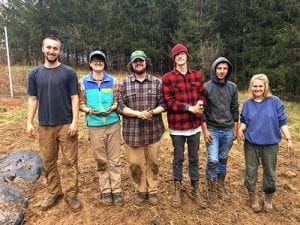
Work crew who planted Phytophthora-resistant chestnut survivors. Photo by Paul Sisco
Students from Warren Wilson College in Asheville, NC planted 160 chestnuts at the campus on November 29 after delays due to cold weather and the first dusting of snow in the Asheville area. The seedlings are from 40 different genetic families from across the native range and represent many TACF chapter breeding program materials. These trees were screened for Phytophthora Root Rot (PRR) resistance at the Bent Creek Resistance Screening Center in Asheville.
The students, led by Carolinas Chapter member and Warren Wilson College’s Forest Manager, Shawn Schwartz, have been involved with the 2018 PRR screening all year. Schwartz and his student workers have participated in every event at the Resistance Screening Center, including sowing the seeds in February, inoculating with Phytophthora cinnamomi in May, and root ratings in November. Warren Wilson College was the home of a backcross orchard for the Carolinas Chapter that began in 2001, but later failed due to a strong presence of Phytophthora cinnamomi at the orchard site.
TACF works with the US Forest Service and receives guidance from Dr. Steve Jeffers from Clemson University to screen up to 5,000 trees per year with the goal of finding trees that carry resistance to PRR. The PRR screening this year included around 80 families and 3,500 seedlings. At the time of the root rating, around 650 seedlings had survived in potting mix infected with Phytophthora cinnamomi. Out of the 650 survivors, around 250 showed moderate to high levels of resistance to the pathogen. The resistant trees will be grown in the field, and once mature, will be used to combine blight and PRR resistance for restoration plantings in locations that are affected by PRR. TACF’s 2019 PRR screening will begin in February.
